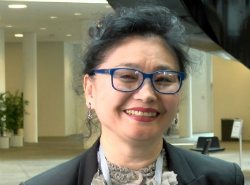Meet Dr Roza Abzalova and the Demeu Primary Health Care Centre

Meet Dr Roza Abzalova. Trained as a cardiologist, Dr Abzalova became a convert to primary health care when she began to witness chronic patients’ struggles with managing their medications and their deteriorating social, physical and occupational functions day after day. Getting primary care training allowed her to work with people in their own communities to directly address the root causes of their ill-health.
In describing the challenges faced, she explained, “Times change, people’s needs change as well, we face new social and economic challenges but also new diseases. We have to move along with these changes and treat every person, every individual as quite unique, with unique individual and family needs that are also constantly changing. Only truly integrated services can achieve this.”
Over the past 10 years, Dr Abzalova and her colleagues at the Demeu Primary Health Care Centre in Astana have been inspiring providers and managers across Kazakhstan on how to design, organize, manage and improve their services to meet current patient, individuals and population needs. These are some of the innovative services Demeu Centre recently implemented to adopt a people-centred approach:
- expanding the scope of practice and professional autonomy of patronage nurses to secure more comprehensive and timely maternal and child health care; and
- the introduction of rehabilitation services for the growing number of patients requiring physiotherapy after being discharged from hospitals.
In order to achieve this level of excellence, Demeu Centre supports staff continuous learning, promotes opportunities for multidisciplinary collaboration, provides education for patients, links to the community, proactively informs the community about their services, and monitors their satisfaction to trigger improvements.
But Dr Abzolva cautions that “transformation of health services should not be limited to primary care, but include all levels of care as the introduction of new services impact the entire health system recognizing that all levels have a role to play.”
When we inquired into which supports enabled these changes, Dr Abzalova emphasized the importance of the Regional Health Department of Astana that provided the legal mandate to reorganize services. These services are now included in the benefit package for all patients. She also acknowledged the extra funds received by the Government. Dr Abzalova explained that “it is also very important to involve and empower primary health care professionals, i.e. those practitioners that will, in practice, deliver those services”.
Finally, when we asked what advice Dr Abzalova had for the Region’s future health leaders? Her response was “courage, conviction that the work is relevant, continuous self-improvement and perseverance.”



